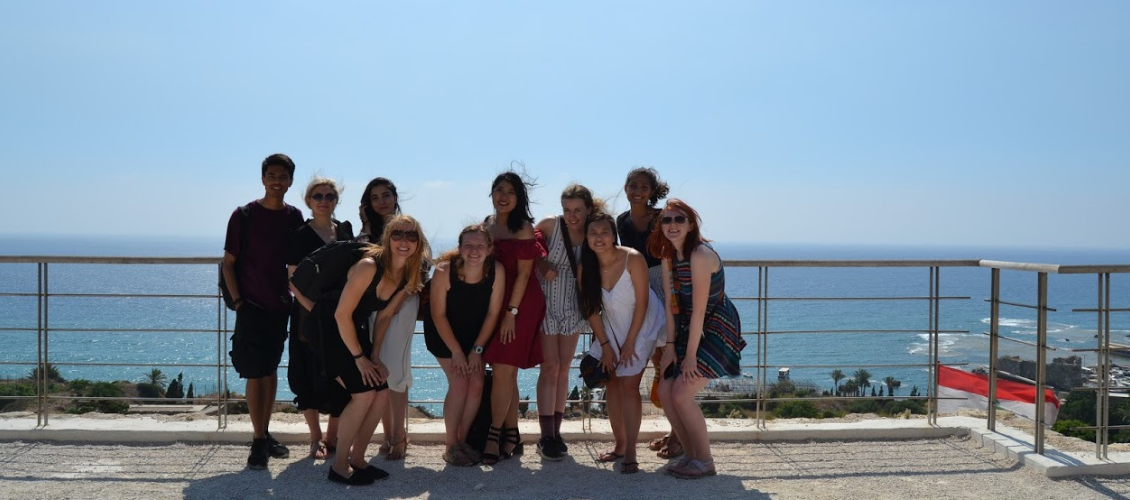Mary ~ BU ’20
My three week trip to Beirut, Lebanon was for a humanitarian engineering course aimed at creating solutions for Syrian refugees living in temporary settlements in Lebanon’s Bekaa Valley. The course is being instructed at the American University in Beirut, an absolutely beautiful institution sitting right on the Mediterranean Sea, sprawling with a variety of vibrant trees and flowers, gorgeous burnt orange and yellow buildings, and an outlandish number of semi-domestic cats. A major component of the course is an emphasis on an interdisciplinary approach to problem solving and humanitarian design, and as a pre-med major with an interest in public health I am especially interested in both the health issues existing within these settlements, and the implications these observations could have for the world’s future climate refugee population. Instructors include experts across a variety of fields from AUB, BU, and Johns Hopkins University, and so far the course has been both incredibly informative and emotionally moving.
Although being across the world was not the plan I had previously made for this summer, I am so unbelievably grateful for the series of events (some of which seemed unfortunate, at the time) which have granted me such an amazing opportunity. Upon being offered this chance, I was initially hesitant due to the American stigmatization of the Middle East… and, of course, the U.S. Department of State’s advisory to “Reconsider Travel”. (Then again, in the country I call home children are being stolen from their families and imprisoned in cages as I type this, so I don’t really know how much I can be expected to trust the source.) I wasn’t the only one; my (loving!) mother, bless her heart, was not entirely thrilled and about half of the reactions to my announcement of this trip were more or less: “you’re doing WHAT, now?!” However, the other half’s amazed and supportive reactions, as well as my father’s reminder that this opportunity was truly once in a lifetime, strengthened my confidence that embarking on this adventure was the right choice. And now that I am in the middle of it, I cannot believe I almost let a little anxiety keep me away from this experience. I can’t help but wonder what other incredible things I’ve missed out on due to fear or uncertainty, and from now on I’m absolutely determined to do the things that scare me—scratch that, to do the things that absolutely terrify me. After all, the highest risk yields the highest reward.
What I would argue is the most integral part of the course has been our visits to refugee settlements within the Bekaa Valley. My team has been welcomed into several homes to discuss living conditions with refugees, and will be making one last visit next week to test our intervention’s design with the camp’s population. The impact these visits have made on me is certainly not something I am able to put into words at the moment. They have been eye-opening and heartbreaking, to say the least. The thing that struck me the most was the importance of hospitality to many of those living in the settlement. Most families do not have enough water for themselves, yet they still offered my entire team something to drink during our visit and refused to accept no for an answer. I hope at some point in the future I’ll be able to describe my reflections from these visits far more eloquently, but for the time being I’ll have to leave it at a simple expression of eye-opening gratitude.
One thing I’ve discovered about the course that I wasn’t expecting was the incredible diversity of the people I’ve been able to work with. Every person on my five member team calls a different country home, and I’ve collaborated with people hailing from a rich variety of places and perspectives. I even met a person who was unable to accept their job offer at a world class medical institution in the US due to the country on his passport. It has been a wonderful and much needed escape from the esoteric attitudes of American universities to discover the brilliance that can be found all over the world. I feel like it can be all too easy to get caught up in the false idea that universities in the Occident are objectively and definitively the best in the world, especially now that I live in the midst of East Coast elitism and feel the constant weight of a wrongly assumed Ivy League superiority pushing down on me. The world is so big and contains so much beauty and brilliance, and although I am grateful for the wonderful education I am receiving at BU, this experience has been an important reminder that the world’s most brilliant minds are absolutely not contained within the borders of Cambridge or Palo Alto, and I look forward to seeking them out in every corner of the globe for the rest of my life.
Aside from the course, I’ve been doing my best enjoy the day-to-day beauty Lebanon has to offer. I’ve discovered a couple new fermented friends in the form of Almaza and 961 Lager, and I’ve watched more socc–I meant, FOOTBALL in the past few weeks than I have in my entire life. I enjoyed a wonderful trip to Byblos, one of the oldest continuously inhabited cities in the world, last weekend with both old friends and new. The people are absolutely wonderful and I am truly having the time of my life. Before this trip, Beirut wasn’t even on my radar of must-visit places. Now that I’m here, I can’t imagine missing out on the rich culture and history this wonderful city has to offer.
Mary is pictured above visiting ancient Byblos with other students in the July 2018 session.
Mary is a Junior studying biology at Boston University. She participated in the July 2018 session.
